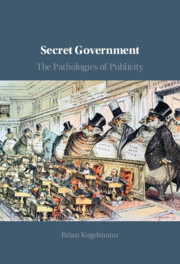Book contents
- Secret Government
- Secret Government
- Copyright page
- Dedication
- Contents
- Tables
- Acknowledgments
- Introduction
- Chapter 1 Publicity in History
- Chapter 2 Democracy Thrives in Darkness
- Chapter 3 Open versus Closed Deliberation
- Chapter 4 Publicity and the Rule of Law
- Chapter 5 Government House Moral Theory
- Chapter 6 Seeing Justice Done
- Chapter 7 Mutual Knowledge of Justice
- Chapter 8 Putting the Philosopher in the Model
- Conclusion
- References
- Index
Chapter 2 - Democracy Thrives in Darkness
Published online by Cambridge University Press: 04 November 2021
- Secret Government
- Secret Government
- Copyright page
- Dedication
- Contents
- Tables
- Acknowledgments
- Introduction
- Chapter 1 Publicity in History
- Chapter 2 Democracy Thrives in Darkness
- Chapter 3 Open versus Closed Deliberation
- Chapter 4 Publicity and the Rule of Law
- Chapter 5 Government House Moral Theory
- Chapter 6 Seeing Justice Done
- Chapter 7 Mutual Knowledge of Justice
- Chapter 8 Putting the Philosopher in the Model
- Conclusion
- References
- Index
Summary
Most democracies are representative. Elected by the people, representatives constitute a legislature and create laws. This is typically done through voting. This raises an interesting question of institutional design: should our representatives vote transparently or by secret ballot? No contemporary philosopher, to my knowledge, has addressed this question. In this chapter I argue that if we take seriously the value of political equality—a normative ideal that nearly all democratic theorists embrace—then voting among representatives in a legislature ought to occur by secret ballot. Representatives should vote just as citizens do in elections. Democratic equality, I argue, thrives in darkness.
Keywords
- Type
- Chapter
- Information
- Secret GovernmentThe Pathologies of Publicity, pp. 35 - 63Publisher: Cambridge University PressPrint publication year: 2021

